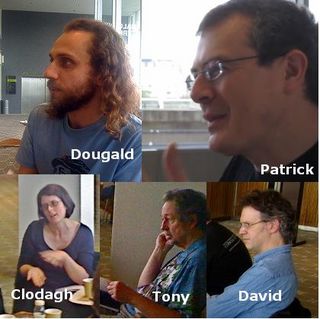23 November 02010
Ollie Nørsterud Gardener: an entrepreneur's vision of peer-to-peer learning in organisations

Can social networks be environments for real learning? What would happen if you tried to mash up social networking and knowledge management with a human-centred approach to how people learn and develop in organisations?
Up until now, the interviews that I've been doing under the Agile Learning banner have been outside my "home territory" of workplace learning supported by technology. There were a couple of reasons for that, but this interview with Olaug (Ollie) Nørsterud Gardener brings it all back home with an account of a start-up technology that uses the connection-centric focus, familiar from social networking, to help people share material that's relevant to what they're doing at any moment.
Fittingly, I came across Ollie via the ambient awareness provided by Twitter. I can't remember whether I started following @olliegardener from my @agilelearn account, or the other way round, but I noticed she was going to be in London for the Connecting HR unconference. I was too late to get a ticket, but during her visit Ollie was kind enough to spare me 45 minute in my regular haunt, looking over the Thames from the Royal Festival Hall.
Ollie is co-founder of the Oslo-based NoddleSoft. Their first offering, as a start-up company, is a platform called NoddlePod, offered on the Software as a Service (SaaS) model with a monthly subscription. One of the things that really got me interested was the thinking and attitude behind NoddlePod. As Ollie put it in her blog last month, 'I just simply don't believe that people can "be developed".' So goodbye to that what an old colleague used to call the sheep-dip approach to Human Resource Development, where everyone gets to jump through similar hoops or gets similar stuff thrown at them.
Noddlesoft's approach assumes that learners want to find things out. It helps them do this by sharing resources and connecting with each other. Even if learners are undertaking the same range of activities — Ollie uses the example of corporate Graduate Programmes — this approach opens out a space for participants to self-organise. They bring their own motivation to bear, based on the challenges in the context they share, and what they learn is then more salient and meaningful than if it were just fed to them in some abstract or remote setting.
Are you in or near London on 15th December? Ollie is going to be in town again then, and we're considering inviting her to one of our weekly learning discussions in the Royal Festival Hall. With it being close to Christmas, we're not sure whether people will have other things on their minds. So, if we're pledging to run this discussion with Ollie only if at least ten people register to attend. Please do this here if you'd like to talk more with Ollie.
How did you come to found NoddleSoft and where have you got to with it?
Olaug Gardener (OG): I founded NoddleSoft out of frustration — frustration that I was in a role where my role was to enable learning, yet I came to feel that what I was doing was more about managing and controlling learning. I felt more of a bottleneck then an enabler.
Continue reading "Ollie Nørsterud Gardener: an entrepreneur's vision of peer-to-peer learning in organisations"18 November 02010
Resilience and scaling down in the face of decline (Dougald Hine discussion, part 2)
With hindsight, it was surprising that the first part of my discussion with Dougald Hine kept to a disciplined track for as long as it did. Perhaps it was the novelty of having the recorder turned on that kept the forces of entropy in check. But entropy will out.
On one level the discussion that follows has almost nothing to do with learning. On another, it has everything to do with learning. Part of the longer discussion we've been exploring concerns how you pull back the lens on your learning context, and what happens when you do? Do you develop a meta-awareness of your own learning process and a critical assessment of the systems in which it is embedded? Or is the meta-level not higher, but just different. I'm not sure now whether the discussion is profoundly important or just by the bye.
But here we start talking about scaling down and becoming more self-reliant. To what degree is this a response to a perceived, or real, decline in the fabric of our lives and infrastucture of our society. (Remember, I kicked off this thread 15 months ago talking about learning in the context of "progressive austerity" — a term that has since lost whatever charm it might once have had).
A reminder that you can also read Dougald's own take on the same discussion, including an audio edit. Here we pick up the discussion where Dougald Hine has just been talking about the complacency of Higher Education in the face of a potential "scaling down" in the institutional infrastructure you need to organise rewarding learning relationships.
Tony Hall: Is there a name for the process of the scaling down? Because I am thinking of Illich again and Tools for Conviviality, which influenced me incredibly in terms of giving me the confidence to say the only tool I need to work with in education is my camera. And that is what I have always done — because everybody, more or less, has a camera. So you could just use that as your educational tool — you need nothing else in a way. Is that whole sense of "scaling down" is that a Dark Mountain thing, a Collapsonomics thing?
Dougald Hine (DH): The Collapsonomics stuff I have been writing recently deals with the sense that, in some significant ways, the middle class existence is being eroded. We are living through the immiseration of the bourgeoisie.
Continue reading "Resilience and scaling down in the face of decline (Dougald Hine discussion, part 2)"
Subscribe to my RSS feed, which covers this blog, my book blog, and further commentary on other web resources (more feeds below)
Resilience and scaling down in the face of decline (Dougald Hine discussion, part 2)
Cinema (24)
Cultural Calendar (86)
Curatorial (66)
E-learning (102)
Events (35)
Future of Music (95)
Human-Computer Interaction (62)
Ideas and Essays (37)
Long Now (18)
Miscellany (44)
Music and Multimedia (157)
Playlists (27)
Podcasting (12)
Politics (12)
Radio (48)
Reviews (58)
Social Software (60)
Teaching (23)
Alternatively, see the Date-based Archives
Recommended: RSS feed that combines items on this site, my book blog, and commentary on other web resources
RSS feed for this site only
RSS feed for my book, Net, Blogs and Rock'n'Roll
RSS feed for shared bookmarks
My latest bookmarks (click 'read more' for commentary):
My archived bookmarks (02004-02008)
On most social sites I am either 'davidjennings' or 'djalchemi', for example: Flickr, Last.fm, Ma.gnolia and so on…
Lateral Action — managing creativity
Herd — social cognition
Seb Schmoller's e-learning mailings
Viridian Design Movement
Tom Phillips — artist
Long Now blog — resources for long-term thinking
Longplayer live stream — 1,000-year composition

The contents of this site are licensed under a Creative Commons Licence except where otherwise notified.
Hosted by Paul Makepeace
W3C Standards
Check whether this page is valid XHTML 1.0
Check whether the CSS (style sheet) is valid


